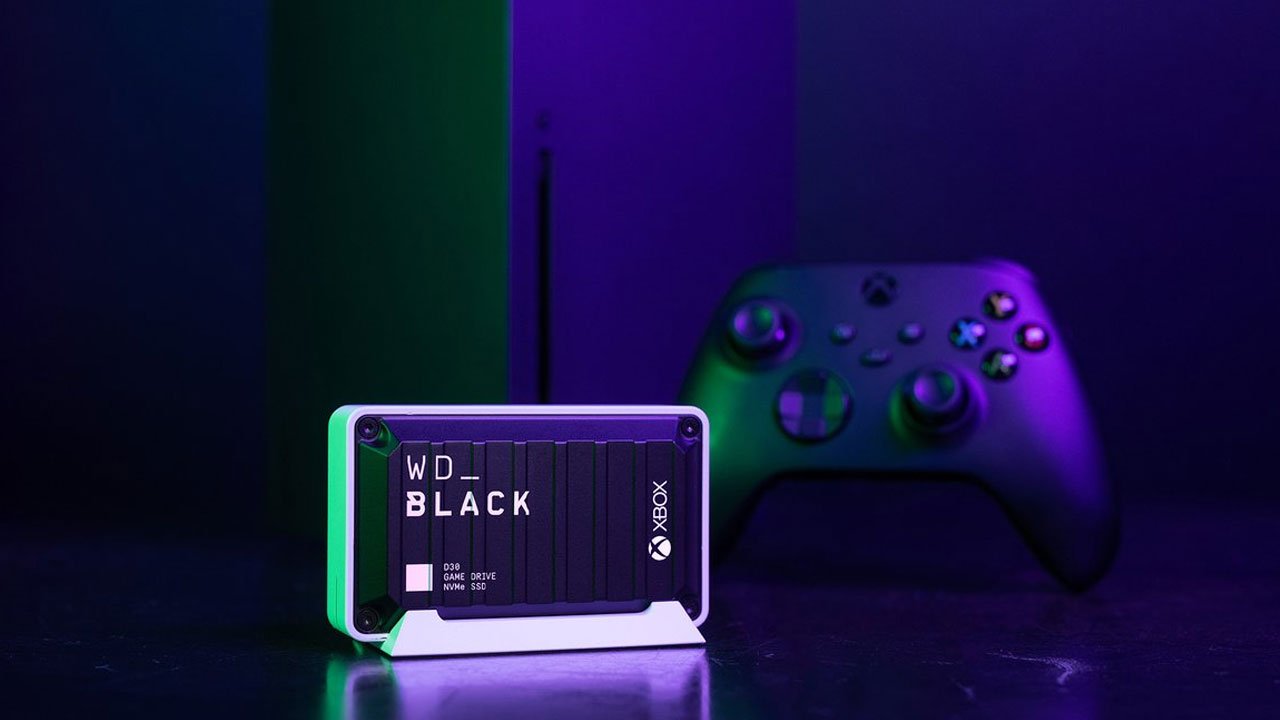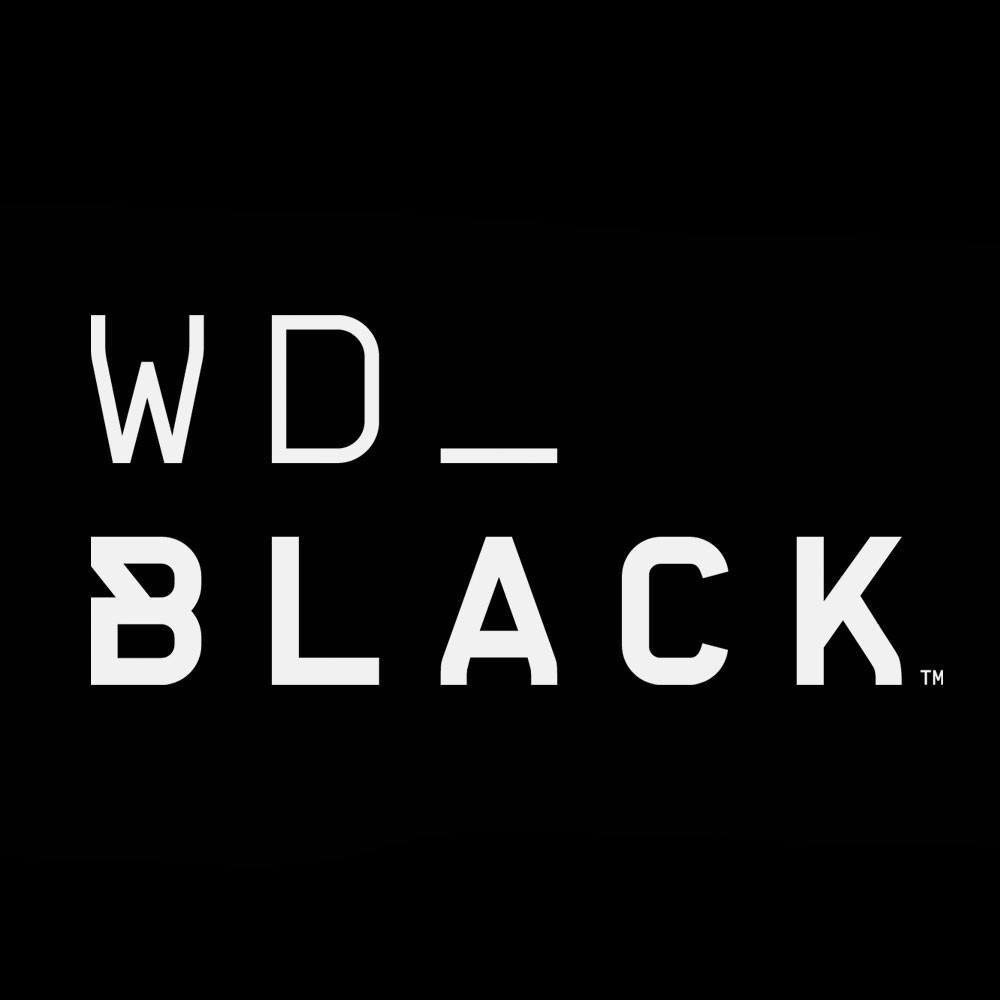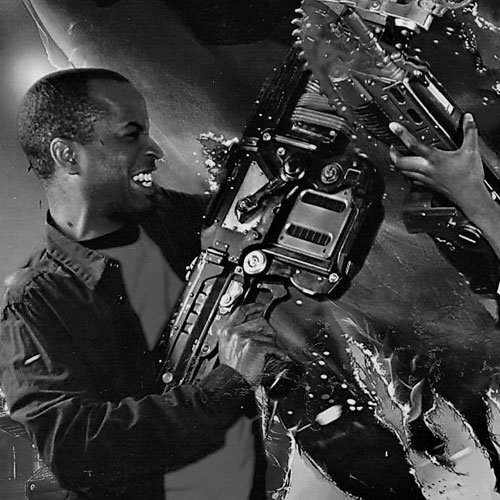These days, it seems that whenever one brings up storage options for next-gen consoles (i.e., PlayStation 5 and Xbox Series X and S), it’s all about NVMe. This is especially the case for both the disc and disc-less editions of the PlayStation 5, for which Sony recently opened up limited support for internal NVMe SSD drives to PS5 owners participating in the most recent OS beta. According to Sony, only certain specifications of this expensive high speed memory format are fast enough to match the console’s lightning-fast internal drive, hence the limited public rollout of the feature.
Meanwhile, over in Xbox-land, where internal memory upgrades have been completely off the table from the beginning, but the vast majority of Xbox games can run off of standard drives (at least for now), plug-and-play expansion options abound, from your average USB 3.0 external HDD to Microsoft’s much faster (not to mention pricier and proprietary) Seagate Storage Expansion Card. Consequently, NVMe storage doesn’t enter the Xbox conversation quite as often, but that hasn’t stopped some of Seagate’s competitors from trying.
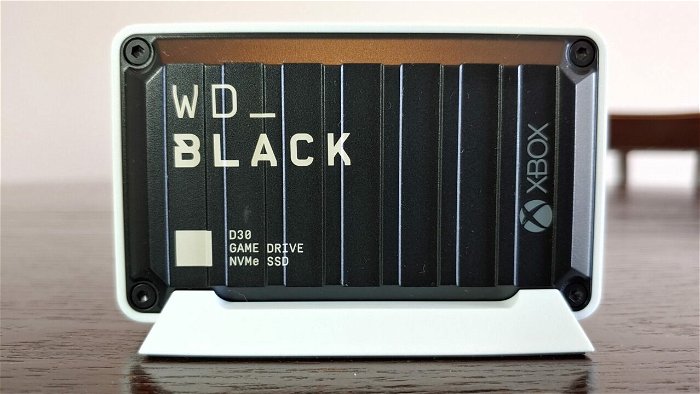
Enter the WD Black D30 NVMe SSD Game Drive for Xbox, which clearly aims to strike an acceptable balance between the affordability of a mechanical hard drive and the faster loading and startup times that hardcore gamers have come to expect from PS5 and Xbox Series X|S; thanks to the revolutionary internal SSD speeds of those consoles as well as the aforementioned Seagate Expansion. Considering how cost-prohibitive SSD prices have been over the past year and continue to be, however, it’s a fair question to ask if such a happy medium is even feasible.
Similar to the WD Black P10 Game Drive that we reviewed back in June, the Black D30 sports the same industrial-meets-military-black-ops design that helps it to stand out from competing drives on the market, but this Xbox-branded variant has a bit more going for it visually; it’s actually kind of cute. The white & black colourway makes the Black D30 a perfect visual companion piece to the standard Xbox One S or Xbox Series S, and the slightly smaller footprint granted by the slimmer, more compact NVMe SSD that it contains allows for a compact form factor that takes up very little space.
The included stand for the casing and the much-appreciated move to USB-C connectivity are also great touches, especially the latter, as users can now easily replace the—much-too-short—included USB 3.0 cable with a longer, inexpensive one if needed.
“The D30 cannot run Xbox games that are designed, upgraded or updated to specifically take advantage of the Xbox Series consoles’ Velocity Architecture”
Before diving into testing, it should be clarified that despite being Xbox-branded, the WD Black D30 for Xbox is essentially no different from the standard, all-black variant that’s currently available for PlayStation 4, Xbox One and, of course, PC. On one hand, this is good news for would-be-buyers who are looking for flexibility in their storage options (after all, they might want to buy the D30 in all-black, repurpose the drive to be used with another console or PC, or simply use it for storing media such as high-quality gameplay clips and screenshots captured via Xbox DVR, for example).
Unfortunately, on the other hand, the Black D30’s generic specification is also its biggest Achilles’ heel; just like every other external HDD and SSD out there on the market that isn’t the Seagate Expansion, the D30 cannot run Xbox games that are designed, upgraded or updated to specifically take advantage of the Xbox Series consoles’ Velocity Architecture; it can only store them.
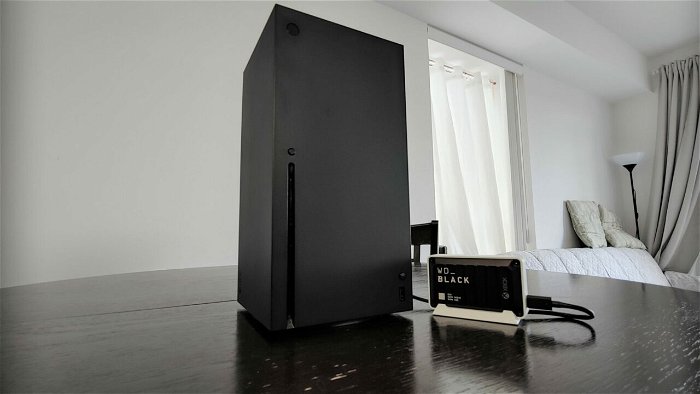
At present, the list of games that won’t work is relatively small, but that number grows larger by the day and already includes tent pole Microsoft-exclusive games like Gears 5, The Ascent, and Halo: The Master Chief Collection as well as a wide sampling of third-party games, ranging from triple-A fare like from Star Wars: Jedi Fallen Order to indie darlings like The Medium and The Touryst.
It’s inevitable that the list of affected titles will continue to grow exponentially as the current console generation fully transitions to Gen 9 over the next few years, which not far down the road could potentially render all external, non-bespoke storage solutions for Xbox Series consoles obsolete for anything outside archiving titles or playing older, unenhanced back-compatible games. But more on that later.
In the interest of brevity, my focus while testing the Black D30’s NVMe was strictly centred upon the device’s file transfer times and game startup times as compared to the other two external storage options currently available to Xbox owners, the Seagate Expansion Card or a standard USB 3.0 mechanical HDD. Already having the latter two items and my Xbox Series X at the ready, I swiftly got down to work.
The four titles I chose for my tests were The Touryst, The Medium, The Witcher 3 (GOTY), and Red Dead Redemption 2, the former two representing games that can only be archived, not played on external media like the Black D30 and the latter two being games infamous for their large file sizes and/or lengthy, initial loads. The results, while not completely shocking, proved interesting.
WD Black D30 NVMe SSD Game Drive for Xbox
| Title | Time from XSX Internal | Time back to XSX Internal | Startup Time to Controllable Character) |
|---|---|---|---|
| THE TOURYST (548.9 MB) | 2.92 sec | 3.12 sec | N/A |
| THE MEDIUM (22.9 GB) | 3:33.75 min | 1:40.06 min | N/A |
| THE WITCHER 3 GOTY (40GB) | 8:12.15 min | 2:25.56 | 1:12.12 min |
| RED DEAD REDEMPTION 2 (123.43 GB) | 25:16.81 min | 6:23.95 min | 1:08.25 min |
Seagate Storage Expansion Card for Xbox
| Title | Time from XSX Internal | Time back to XSX Internal | Startup Time to Controllable Character) |
|---|---|---|---|
| THE TOURYST (548.9 MB) | 2.34 sec | 2.87 sec | N/A |
| THE MEDIUM (22.9 GB) | 33.75 sec | 34.00 sec | N/A |
| THE WITCHER 3 GOTY (40GB) | 1:21.83 min | 1:04.84 min | 1:10.89 sec |
| RED DEAD REDEMPTION 2 (123.43 GB) | 3:09.05 min | 3:49.37 min | 1:09.16 sec |
Standard Seagate Portable HDD
| Title | Time from XSX Internal | Time back to XSX Internal | Startup Time to Controllable Character |
|---|---|---|---|
| THE TOURYST (548.9 MB) | 15.77 sec | 11 sec | N/A |
| THE MEDIUM (22.9 GB) | 6:10.79 min | 5:56.95 min | N/A |
| THE WITCHER 3 GOTY (40GB) | 9:02.22 min | 8:27.83 min | 1:43.51 min |
| RED DEAD REDEMPTION 2 (123.43 GB) | 35:45.29 min | 19:12.29 min | 2:07.02 min |
With the Microsoft-endorsed Seagate Expansion boasting transfer speeds of up to 2.4 GB per second to match that of the Xbox Series X’s custom internal NVMe SSD tech, it should come as no surprise that it handily trounced the D30 in every single file transfer test, moving games as large as Red Dead Redemption 2 (a 123 GB file) off the internal memory and back in less than four minutes each way, and smaller games like The Touryst (548.9 MB) and The Medium (22.9 GB) in just seconds.
As demonstrated by the charts above, the Seagate expansion was often three to four times as fast at moving game data than the D30, and in some cases, almost eight times as fast. It’s important to bear in mind though that most high-performance SSD external drives cap out at around 1000MB/second over a USB 3.0, connection (the D30 claims transfer speeds of up to 900MB/s) so it was never going to be a fair fight between the pair anyway.
Nevertheless, when considered as a faster alternative storage solution compared to a standard HDD, the Black D30 shone bright like a diamond in these tests, consistently delivering transfer speeds up to three times as fast as the mechanical drive. Not as eye-wateringly fast as the Seagate Expansion, but still a time saver for the price-conscious power-user who plans to move a lot of files around. Much more impressive were the Black D30’s startup times, in which I was able to get from firing up the game to controlling Witcher 3’s Geralt and RDR2’s Arthur in 1:12:12 minutes and 1:08:25 minutes respectively.
“…when considered as a faster alternative storage solution compared to a standard HDD, the D30 shone bright like a diamond in these tests, consistently delivering transfer speeds up to three times as fast as the mechanical drive.”
These times were not only on pace with the Seagate Expansion’s results, but also half a minute to a full minute faster than the HDD. Hardly an extensive analysis, but the numbers at least seem to bode well for the D30’s performance in cutting down time spent staring at load screens in general. It even appears to be equally performant to the Seagate Expansion when it comes to games that are already installed, provided of course that they can actually run off the D30, which brings us back to the sticky predicament that the Black D30 and just about any external drive made for use with Xbox Series X|S now finds itself in.
Straight up, the WD Black D30 (1 TB model) currently retails between $249.99 and $279.99 CAD, which is not unheard of for a high-performance NVMe drive of that capacity. But it can’t be ignored that Microsoft’s bespoke Seagate Expansion Card (also 1 TB) sells for just a bit more ($299.99 CAD), and that it can directly run all games in the Xbox Series library as well as all the currently backward-compatible Xbox One, Xbox 360 and original Xbox catalogues, past, present, and future with no restrictions.
Buying the Black D30 instead of the Seagate Expansion might save you $30-$50 upfront, but just a single instance of not being able to immediately start up a game in your library simply because it’s stored on your D30 and not the internal drive of your Xbox Series X or S might be enough of an annoyance to completely nullify the fleeting satisfaction of that cost saving (and it definitely won’t just be a one-time problem as time moves on).
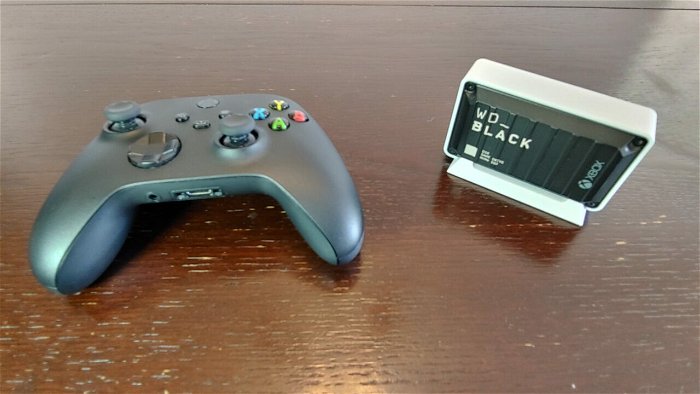
This shouldn’t be an issue for Xbox Series X or S owners that intend to use the Black D30 strictly as a “fast” external storage option only, but if storage space is the priority, and you’ve already embraced the idea of shuttling games back and forth between your internal drive and an external, why would you spend the equivalent of two standard 5 TB mechanical drives for just 1 TB NVMe that will occasionally save you 20 minutes on a file transfer?
The cost vs. efficiency vs. value equation just doesn’t add up here, especially when the prospect of fewer and fewer Xbox Series games being able to run off the Black D30 is basically the equivalent of having an unknown expiry date looming over the product. Once the exclusivity arrangement between Microsoft and Seagate expires and competitors like WD can manufacture their own licensed versions of the official expansion card, this problem will go away. But at present this is the situation on Xbox Series consoles.
That said, if you are still gaming on an Xbox One, Xbox One X, PS4, PS4 Pro or PC where Velocity Architecture doesn’t place limits on its flexibility, the Black D30 might be just the nimble sidekick your console needs, rather than an Xbox Series pack mule.
